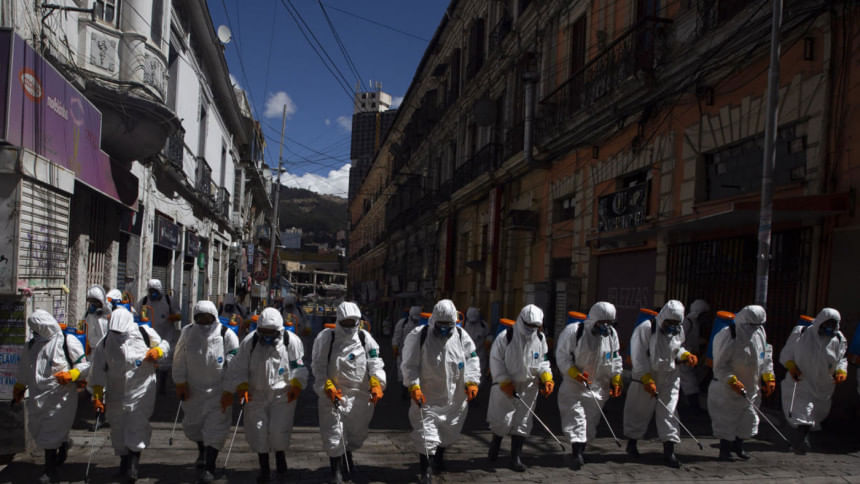Why Kerala has succeeded in controlling coronavirus

A recent headline in Prothom Alo (June 26, 2020) stated, "Amartya Sen and Noam Chomsky showered Kerala with praise for their successful containment of the coronavirus". Kerala's advancement in education, primary healthcare and human development are generally considered the main reasons for such success. But there are other factors behind Kerala's stellar performance against the coronavirus, the most important of which is a strong and effective panchayat system, and the political commitment to make the best use of it by engaging and empowering the communities.
Through sustained efforts of many years—Rome was not built in a day—an effective three-tier system of local government was established in Kerala, whose dividends the state derived during the current coronavirus pandemic. At the rural level, Kerala now has 941 gram panchayats, 152 block panchayats and 14 district panchayats. In urban areas, there are 87 municipalities and 6 municipal corporations. The average population of a gram panchayat is 25,000. In Kerala, the average number of gram panchayat employees is 10-25, however, the 8-13 institutions working under them, including the primary healthcare institutions, have an average of 200 employees. It is to be noted that in Bangladesh at present there is only one employee of the Union Parishad and the amount of resources under its direct control is very small.
In Kerala, the gram panchayat members are elected directly from the ward level and the panchayat head and co-head are elected by ward members. Women from reserved seats for women are elected using a "rotational system" and they enjoy the same responsibilities and powers as those elected from regular seats. Elected panchayat representatives are accountable to the people and corruption is not a problem in Kerala.
On the other hand, our current local government representatives have come to power through extremely controversial elections. Most of them are victims of "nomination-trade"—buying party nominations with money. We are thus not surprised that during the current pandemic, about 100 local government representatives were punished for corruption. In addition, the prevailing structure of corruption and "partyarchy" that has developed at the local level makes it almost impossible for elected representatives to perform their duties without becoming corrupt.
One of the key contributors to Kerala's success was the People's Plan Campaign, a statewide people's movement for local planning launched in 1998. As part of this campaign, 35 percent of the state's development budget was transferred to local government institutions. This movement was implemented through the state's Department of Local Self-Government and the State Planning Board, which resulted in deepening public engagement with the panchayat system in Kerala, magnifying the role of the panchayat in ensuring the overall welfare of the people.
As part of this role, each panchayat formulates plans to deal with disasters and climate change, which brings ordinary citizens and public servants to work together in emergencies under one command structure. The plan created "First Responder Teams" with people having deep knowledge of their communities. The formulation of the disaster plan requires assembling all relevant information about the community. This disaster plan was used to deal with the floods of 2018 and, in light of that experience, the plan was updated and made more effective.
At the onset of the coronavirus pandemic, a "Rapid Response Team" was formed in each ward of the gram panchayat under the leadership of elected members. All health workers, panchayat workers and other volunteers became part of this team. Members of the Kudumbashree (women's self-help groups) and Angawanwadi (childcare centres), which are centrally sponsored schemes, and Resident Associations were included in these teams. In 2020, volunteer teams of 336,000 citizens were formed in Kerala for managing natural resources.
During the coronavirus pandemic, the members of the Rapid Response Team did, broadly speaking, three Cs: communication, coordination (including planning, managing and monitoring) and community engagement to contain the coronavirus and mitigate it locally. For communication, they started a campaign to promote three Ws: washing hands, wearing masks and watching physical distance. As part of this campaign, Rapid Response Teams created websites as repositories from which citizens received relevant and accurate information. They also set up call centres, help desks, online counselling and WhatsApp groups.
Rapid Response Teams identified those who were infected and ensured their home and institutional quarantine. They carried out contact tracing to break the chain of infection. In addition, they set up mobile clinics in their communities to provide essential health services.
Rapid Response Teams arranged home delivery of medicines and other emergency items. They set up community kitchens to provide food to those in need. They also inspected grocery stores and fish markets to prevent the spread of the virus.
With the realisation that they were in it together, Rapid Response Teams ensured the safety of all, irrespective of race, religion and political identity, which has been a tradition in Kerala. At the same time, they made lists of the most vulnerable and provided special protection for them. They created GIS maps of migrant camps and provided support to the migrant workers.
Rapid Response Teams, formed at the ward level under the leadership of elected representatives, mobilised and brought together the whole community to stop the virus at its track. Their success was largely due to the trust, cooperation and involvement of every person of the community. The communities also set up check-posts in their respective boundaries to prevent the spread of the virus beyond their neighbourhoods. All the institutions of the state were involved in this work, although the elected panchayat representatives provided leadership in the field. The state also provided budgetary support and flexibility.
It should be noted that during the coronavirus pandemic, the political leadership of Kerala built a relationship of trust with the people. Every day the Chief Minister and his colleagues arranged briefing sessions to freely share all relevant information in order to take people into confidence. This created a relation of mutual trust and confidence between the leaders and the people, contributing to the successful containment of the coronavirus in Kerala.
The political commitment of the state government has also played a significant role in this regard. In an article in the Economic and Political Weekly (June 13, 2020), Kerala's Chief Minister Pinarayi Vijayan said, "In times of pandemics like Covid-19, the relationship between the state and the people needs to be strong, trustworthy and organic. This will not be possible in a centralised system of governance, wherein even minor decisions are taken at the highest tier of the government, which is the farthest from the people... centralisation violates the principle of subsidiarity, which states that the tier closest to the people can discharge local functions more effectively. In our view, when you are faced with a contagious disease that could quickly attain the stage of community spread, the best strategy to contain it is a participatory mode of governance. The prime role in this is to be discharged by the local governments with community participation."
Dr Badiul Alam Majumdar, Global Vice President and Country Director, The Hunger Project Bangladesh.

 For all latest news, follow The Daily Star's Google News channel.
For all latest news, follow The Daily Star's Google News channel. 



Comments